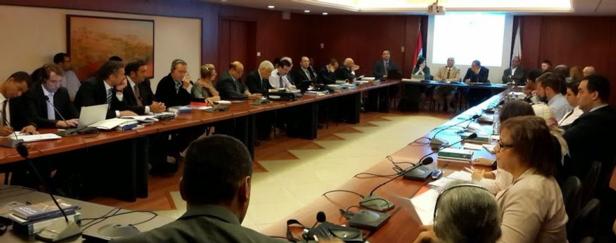Introduction: The Arab Association of Constitutional Law and the Faculty of Juridical, Political and Social Sciences of Tunis (University of Carthage) are organizing the first session of the Arab Association’s Constitutional Academy (the Academy) from 1 December 2015 to 31 January 2016 in Tunis, Tunisia. The Academy is part of an effort to encourage a more dynamic, continuous, and in-depth exchange of ideas between leading policy-makers and scholars in the Arab region. The Academy seeks to identify trends in constitution-making across the region and will focus on the reform processes that began in 2011. It will examine both how new constitutions were negotiated and drafted, and the ways they have been implemented. The Academy will create space for experts from across the region to engage with each other on a selected number of substantive areas and provide the opportunity to explore whether possible solutions to their common problems exist. The Academy’s participants will be selected according to a competitive process (see below).
The Academy’s proceedings: Academy participants will spend two months in Tunis, Tunisia. During that period, they will work together to produce a number of joint policy papers on a specific and predetermined substantive areas (see below). Academy participants will be assisted by leading Tunisian, Arab and international scholars who will follow and contribute to their work on a regular basis. Academy participants will be required to organize a public colloquium on their work at the Faculty of Juridical, Political and Social Sciences of Tunis (University of Carthage) on the substance of their research.
The papers: Academy participants will be required to produce joint papers in Arabic, with final versions to be published in Arabic and English (via commissioned translation). The papers will be published online and in the Arab Association of Constitutional Law’s Yearbook. The papers must:
(i) Be critical and analytical. A purely descriptive and superficial approach will not be accepted.
(ii) Be comparative in their approach. The papers must consider multiple constitutional systems from the Arab region, and must also consider multiple systems external to the region, with special emphasis on the Global South.
(iii) Go beyond the constitutional text and consider implementation issues.
The research question: Academy participants will be required to research and publish a joint policy paper on “The Judiciary in Arab Constitution-Building Processes”. The research question should break down as follows:
(i) The Judiciary’s Role in Arab Constitution Building Processes: Courts in many Arab countries decided important issues during recent constitutional drafting processes. Most famously, in Egypt, the Supreme Constitutional Court and the High Administrative Court dissolved a constitution drafting body, dissolved the parliament which appointed that same constitution drafting body, and ruled that the 2012 constitution could not be suspended, amongst other major decisions. High courts in Libya, Tunisia and other countries were also involved in their own respective national processes, although to a lesser extent. Academy participants will be required to research this issue, mainly with a view to answering the following questions:
(a) What role did judiciaries play during the constitution-making processes in transition countries? Why, and under what conditions, did courts and judges play a pivotal role in the constitution making process? Why was judicial intervention in the constitution building processes more significant in Egypt, less pronounced in the case of Libya and Tunisia, and almost nonexistent in other cases? Is there a correlation between the intensity of judicial intervention and traditions of institutional independence?
(b) What implications did the judiciary’s role have on the constitution and the legitimacy of the court?
(c) What should the judiciary’s role have been? Is there a balance between a judicial role that guards rights and liberties and another that threatens the processes of democratization? What do previous experiences of judicial interventions in the constitution building process teach us about the role of the courts and the types of constitutions this process could produce?
(ii) Re-imagining the judiciary’s mandate and functioning: From 2011 to 2015, constitutional drafters across the region considered how their respective judicial sectors should be reformed. This was critical given the role that judiciaries played across the region in the recent past. Academy participants will be required to research this issue, with the goal of answering the following questions:
(a) What were the stakes for the relevant parties during the negotiations?
(b) What are the likely long term implications of the reforms that were instituted from 2011 to 2015?
(c) What impact did the judiciary’s involvement on the transition process have on the debate on how the judiciary should be constructed?
Logistics, expenses and honorarium: All of the Academy participants’ travel, accommodation and living expenses will be covered by the Arab Association of Constitutional Law. In addition, each Academy participant will be paid a US$4,000 honorarium upon completion of the research project.
How to apply to the Academy: The Academy welcomes applications from around the world. The Academy’s participants will be selected according to a competitive process. Interested candidates are required to submit an application no later than 25 September 2015. Applications should include the following:
(i) An up to date version of the applicant’s CV.
(ii) A 1,500 word proposal, describing in detail the manner in which the applicant would approach the research question while in residence at the Academy. The statement should also address the importance of the proposed project within the context of the applicant’s own past work (if relevant) and other scholarly work.
(iii) A writing sample (which must be in Arabic).
(iv) Two letters of recommendation.
Applications must be sent to Souhayla Fayad (souhayla@dustour.org) and to Maged Taha (m.taha@idea.int) by the application deadline.
Other: The Academy’s activities have been made possible by generous contributions from the International Institute for Democracy and Electoral Assistance and the Ford Foundation.

